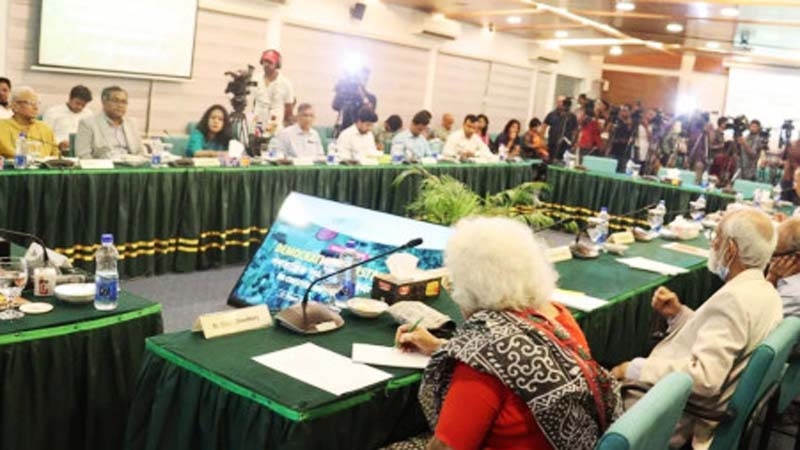- Power transfer, start of new journey for democracy: Prof Yunus |
- NCP Leaders Sign July National Charter in Dhaka |
- Tarique Rahman Vacates Bogura-6 Seat After Dual Win |
- Newly Elected MPs, Cabinet Members to Take Oath Tomorrow |
- India beats Pakistan by 61 runs as World Cup scenario heats up |
Experts Urge Urgent Constitutional Reforms for Democracy

Establishing a truly democratic Bangladesh requires urgent constitutional reforms and fostering democratic practices within political parties, experts stressed during a roundtable discussion on Tuesday.
The event, titled 'Political and Constitutional Reform Proposals for the Establishment of a Democratic Bangladesh,' saw speakers present several key proposals. These included limiting individuals to two terms as prime minister, rebalancing powers between the prime minister and president, introducing proportional representation in parliament, and creating a bicameral legislature. They also emphasized the need for a better balance of power between the executive branch and parliament.
The roundtable was jointly organized by The Asia Foundation, RMMRU, and the Centre for Political Studies at the Prothom Alo auditorium in Karwan Bazar, Dhaka.
In her opening remarks, Dhaka University political science professor Tasneem Siddiqui highlighted that while Bangladesh is moving towards new opportunities, political crises remain the key challenge. She suggested rapid constitutional amendments and raised the possibility of forming a constituent assembly to implement reforms, including the establishment of a bicameral legislature and exploring a federal system.
Tasneem also called for political parties to nominate 33% women candidates, proposing the abolition of reserved seats for women in parliament.
Sonali Bank chairman and former Comptroller and Auditor General, Mohammad Muslim Chowdhury, advocated for proportional representation in parliament, noting that it would significantly enhance government accountability. He also suggested limiting prime ministers to two terms, enacting laws for political parties, ensuring judicial independence, and establishing a constitutional council for key appointments.
Muslim Chowdhury further emphasized the importance of a "social contract" among political parties, committing them to necessary reforms. However, he acknowledged the difficulty of enforcing reforms without a two-thirds majority in parliament and proposed forming a constituent assembly as an alternative.
Local government expert Tofail Ahmed pointed out the absence of a functional local government system in Bangladesh. He recommended direct elections for local government representatives, who would then elect a speaker or chairman.
Former Chittagong University professor Nizamuddin Ahmed highlighted the increasing power imbalance among the legislature, executive, and judiciary. He called for reducing the prime minister's authority, establishing checks and balances, and creating a stronger opposition in parliament. He also stressed the need for dialogue between the government and political parties to initiate reforms.
Jahangirnagar University professor KM Mahyuddin pointed out the lack of oversight mechanisms in Bangladesh's parliamentary system, in contrast to the UK. He called for reforms such as abolishing Article 70 of the constitution, enhancing transparency in election commission formation, and separating the roles of party leader, prime minister, and parliamentary leader.
Dhaka University professor Sabbir Ahmed suggested transferring some of the prime minister's powers to the president to ensure a better balance of power in the constitution.
Other participants included Dhaka University professors Farid Uddin Ahmed and Mohammad Rashed Alam Bhuiyan, and Ph.D. candidate Harun-or-Rashid Mahadi from Kent State University in the United States.
The discussion, moderated by Prothom Alo’s assistant editor Firoz Choudhury, concluded with The Asia Foundation’s Programme Director Mohammad Zakaria expressing gratitude to the participants.

